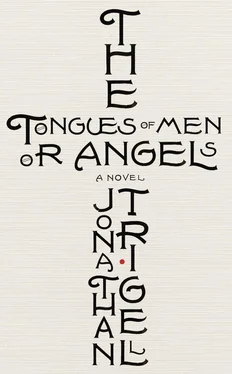‘What’s happening, Father?’ the boy asks.
‘I don’t know,’ the man says, though he suspects that he may.
‘She’s been taken in adultery,’ one of the shepherds says, looking back at the pair.
What’s adultery? Maybe she rode half the village, with the relish the boy used to ride the donkey. Maybe she sought a little solace when her husband was away for months on end. Maybe she sought a little solace because she has no husband, in a place and a time that defines her only by who owns her. It doesn’t matter right now: she’s an adulteress. Or, at the least, she has been taken as one.
She is already bloodied from beating and grabbing. The father would like to divert his path, but he supposes that the boy must eventually learn that things like this happen, that life and people can be sickening and brutish. So they follow the morbid procession, only in that it heads in the direction they would take in any case. They accompany, only in that they do not deliberately alter their course.
There is spittle in the corner of the woman’s mouth. Some kind of fear foam that she can’t wipe off because her hands are bound. Tied up, as if there was a way in which a lone, terrified woman could threaten a big group of righteously outraged men.
The men drag her to what must pass as the village square: an open area around the well. A Hasid is there — a holy man — with a few of his followers. Cheap incense smokes, to keep the flies away, next to a basket of puncture-ripened sycamore figs. The Hasid is scratching symbols into the dust; he does not look up, as the mob presents their prisoner.
Many among the throng hold rocks that they have picked up on their route, which suggests that they don’t consider the ending of this story to be in doubt, yet they still wish for the blessing of the Hasid.
The boy’s eyes glisten, like broken eggs, but he wants to stay and watch what happens. His father is torn, unsure if that would be good for his lad or not. But the boy must be a man one day. A day not as distant as the far shore of that lake they call the sea. So maybe this is a good enough time to learn a little of the evil of men. Not a stoning, no, they won’t stay for that. But for this thing here now. For whatever this thing is.
It isn’t a trial, because the Torah lays down strictly what happens at trials. Nor is it quite a lynching, for these men pretend to follow some kind of process. It is an attempt to kill without responsibility for the death; but the man doesn’t know the word for that thing, or if there is one.
‘Who is the Hasid?’ the father asks the shepherd who answered him before.
‘Yeshua bar Abba.’
The father nods: he has heard the name, of course. People round these parts now talk of little else. They say that he is not only a rabban, a magician, a healer and an exorcist, but claims to be a king.
There are three others with him: a massive ox-man, who could look threatening but doesn’t because his smile is soft and sweet as a slice of sabra fruit; and a fellow so similar to the Hasid that he can only be a brother, if not a twin, lean and full of life; and another, who shouldn’t be alive at all, to judge by the wound, scarlet and recent, across his windpipe. But they all three of them seem over-brimming with hope and happiness, like they believe that anything is possible and everything will be well.
The Hasid lifts his head from the riddles he has scribed in the dirt and stares at the crowd, as if noticing it for the first time.
The father and son are too far away to hear exactly what the Hasid says. But the woman, who was hunched and shrunken, gradually straightens. And the man who had a guard’s grasp of her arm steps uncertainly back a pace. That shepherd who answered their questions lets the stone in his hand drop, to dent the earth. And other rocks drop too. They fall to the ground. They do not maim. They do not flay. They slip to the dust.
There are a lot of stonings in this land. Who knows if they will ever stop? But there won’t be one just here. Not today. And that is a better lesson for the boy than the man could have hoped for. He signals with his head that they should continue their journey, and gives the donkey’s hemp bridle a little tug.
‘Is he the king, as they say, Father?’ the boy asks, scampering the three steps he had fallen behind.
‘Well, if you mean is he the rightful descendant of David, the one who should be king, I just don’t see how anyone could know that any more: our people have been to Babylon and back as slaves since then, have been conquered by Assyria, Persia, Alexander’s Greeks, the Ptolemies of Egypt, the Seleucids of Syria, the Herodians and Rome. It must be ten centuries since David. I’m not sure anyone knows that now, not really. But someone has to be the one in line, so why not? Maybe it’s him.’
‘No, I mean the King. Do you think he is the anointed one who will free us, Father?’
‘What I think is that you’re getting a bit old for all that stuff, lad. There’s not going to be any saviour coming. But the Romans will go eventually, like every other empire has. Probably not battled away by the Zealots, or prayed away by the Essenes, but ultimately they will return to their own lands. Likely not in my days, perhaps not even in your children’s, but in due time they will leave, and our people will survive somehow, as they always do.’
‘So he is not the Messiah?’
‘Sometimes, lad, we want our heroes to be greater than they really are, because that excuses us for being less. It’s easy to glorify, but that shrugs off our own failings. If Elijah and Daniel were people like us, then only our own weakness, our own petty evils, our own leather hearts prevent us becoming people like them. If this Yeshua is just a man, it means that if you stay brave and kind and true to yourself, maybe you could grow up to be a man a little bit like him. But even if you don’t, you’re still my child. That’s enough for me. The Pharisees can keep their resurrection. You’re the only afterlife I need.’ He loops an arm over the boy’s thin shoulders. ‘He’s just a man, son, not so very different from those who would have stoned her.’
The father looks back, as he starts to walk on, at the barefoot teacher, still scribbling enigmas in the dust.
‘But he’s a prince.’
Deborah Bernard
Amanda Preston
Sarah Castleton
James Gurbutt
Sam Greenwood
Professor Yan Wong
Simon Pearlman
Clive Hebard
Hazel Orme
Emily Burns
Anna Davis
Elliot Soll
Meriam Mohammad
André Ivangine
Mum and Dad
The kindness and generosity of the peoples of the Bible lands, Turkey and Italy. With special thanks to La Maison d’Abraham in Jerusalem; Eva Gerbi and The Home in Rome; and the Rumshines camp in Jordan.
Manchester University, my alma mater, for the use of their research resources and for Professor Gerald Hammond, who perhaps planted the seed of this story, almost twenty years ago.












